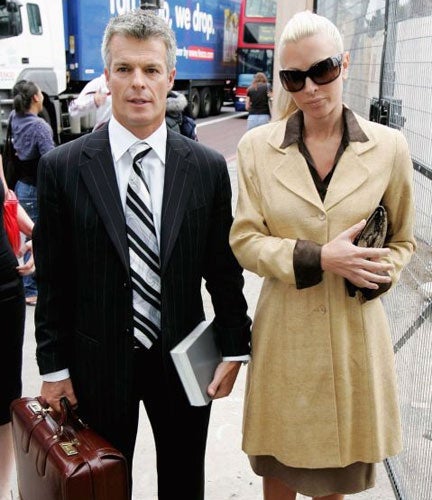'Mr Loophole' performs U-turn on driving laws

Your support helps us to tell the story
From reproductive rights to climate change to Big Tech, The Independent is on the ground when the story is developing. Whether it's investigating the financials of Elon Musk's pro-Trump PAC or producing our latest documentary, 'The A Word', which shines a light on the American women fighting for reproductive rights, we know how important it is to parse out the facts from the messaging.
At such a critical moment in US history, we need reporters on the ground. Your donation allows us to keep sending journalists to speak to both sides of the story.
The Independent is trusted by Americans across the entire political spectrum. And unlike many other quality news outlets, we choose not to lock Americans out of our reporting and analysis with paywalls. We believe quality journalism should be available to everyone, paid for by those who can afford it.
Your support makes all the difference.His talent for using every quirk of the law to help the rich and famous avoid driving bans and points on their licences earned him the nickname "Mr Loophole", as well as making him the scourge of road safety campaigners.
But the celebrity lawyer Nick Freeman, who has successfully defended the likes of David Beckham, Jeremy Clarkson and Sir Alex Ferguson after driving indiscretions, now promises to perform a U-turn that could stop his clients from getting off the hook in future.
In an interview with The Independent, the 53-year-old solicitor has offered to work with the Government to help iron out the legal kinks that have made him so successful. In what will come as a surprise to his many critics, he admitted that some defences he used appeared to be unfair to the public.
"There are so many things that could be done to remove the sort of defences that people run and succeed on that, from the point of view of a layman, shouldn't really make any difference," Mr Freeman said.
"I wouldn't say I know the law better than the Government but I would be very happy to offer whatever help I can to try to make our roads safer."
Mr Freeman came to prominence when he successfully defended David Beckham against a speeding charge in 1999, arguing that the England midfielder had been frightened by a paparazzi photographer while driving in Cheshire. He managed to have a case against the cricketer Andrew Flintoff, who was charged with driving at 87mph in a 50mph zone, thrown out after 41 seconds by showing the notice for prosecution had been sent late.
He also successfully protected a person accused of driving a Porsche Turbo at 176mph by arguing the prosecution could not prove who was driving the car. "There have been massive moves to tighten these areas up, but nevertheless, many still exist," he said.
In particular, Mr Freeman said that drivers accused of drinking before climbing behind the wheel are handed too many rights – putting the safety of the law-abiding public at risk. He also, despite his status as the bête noire of the road safety lobby, came out as an unlikely supporter of calls to lower the drink-driving limit.
The Government has been cautious about backing a reduction in the limit from 80mg of alcohol per 100ml of blood to the European standard of 50mg, suggesting that proper enforcement of the current limit is its priority.
Mr Freeman argued: "We have the highest drink driving limit in Europe. It's utter hypocrisy to allow that level to continue. It should be reduced substantially. I really cannot understand why the Government isn't doing that.
"What is frightening is the subjective element, and how tolerance varies from person to person. One person can be under the limit but still totally unfit to drive. The public don't realise that." He added: "I wouldn't reduce it to zero, but I think it should be substantially reduced. The general European level of 50mg is more than enough."
He said the law should be altered to prevent those accused of drink driving from needing a lawyer present when giving a sample – a tactic used in the past in an attempt to avoid giving a sample over the legal limit.
"There are measures put in place that civil liberty lawyers would applaud, that make sure people are fairly represented. But you might argue that in relation to drink-driving, the rights should relate to the safety of the public," he said. "That should be prioritised at all costs."
The ones that got away
Sir Alex Ferguson, 1999: When Sir Alex drove on the hard shoulder, Freeman had him cleared by saying he needed the toilet because he had an upset stomach.
Wayne Rooney, 2004: Cleared of driving without insurance. Freeman argued he sent a fax asking the case to be adjourned but it had gone ahead in his absence.
Andrew Flintoff, 2008: Caught doing 87mph in a 50mph zone, Flintoff was let off because the prosecution notice was sent two days later than the law allows.
Colin Montgomerie, 2008: Caught speeding for the third time in four years and failing to pay the fine, Mr Loophole said the golfer's schedule and fear of flying meant he had to drive from Scotland to Surrey every weekend. He escaped a driving ban.
Jeremy Clarkson, 2007: Alfa Romeo lent the Top Gear man a car and sent him a ticket when it was caught speeding. But he got off because they couldn't prove who was driving the car at the time.
Join our commenting forum
Join thought-provoking conversations, follow other Independent readers and see their replies
Comments